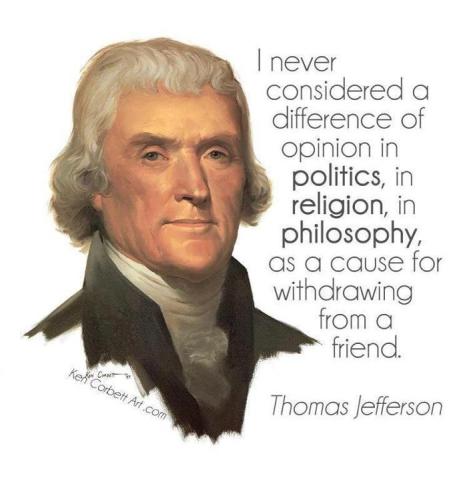So, Thomas Jefferson aside, I was unfriended today. It’s not the first time, I’m sure; Facebook is a big place. But it is the first time that the unfriender felt obligated to come onto my wall and tell me—after about a year without any kind of interaction whatsoever—that I was not the sort of person that she wanted to associate with. I’m not terribly surprised. I’m the sort of person that any number of people wouldn’t want to associated with.
The context of today’s unfriending, I am quite sure, is political. This person and I have always seen things very differently, and now that I’ve decided to play the political pundit, I’m sure that I have become pretty unbearable to some, if not most of my friends. So I certainly don’t have hard feelings.
I am sad, though. Just the word ”unfriend" makes me sad—it seems like such a formal and final way to end even a very casual relationship. In the past, you had to have some sort of real commitment, like being married, to qualify for a formal separation. Nowadays, pretty much anyone can become your unfriend just by pressing a button.
But mainly I’m sad because one of my favorite theories has failed a major test. The theory—which is actually one of the cornerstones of the book that I have been working on for most of the year--goes like this:
An effective republican government requires people who can argue about important issues while remaining friends.
People have never been very good at arguing as friends, but the current media culture has made things worse by creating “echo chambers” where people only interact with those who already share their views and biases.
Social media is an exception to this rule because people interact with friends and family members from many points in their lives, many of whom do not share their current political beliefs.
Because the people we interact with on social media outlets are our friends, we have a strong motivation to preserve our friendships by moderating our tone when discussing important issues.
Therefore, social media outlets like Facebook have the potential to help us overcome the echo chamber effect and learn how to argue as friends, thus making us better able to participate in the democratic process.
It’s a nice theory, and I’ve even got several good studies to back it up. My own Facebook feed—which is almost perfectly divided between those who identify themselves as liberal and those who identify themselves as conservatives—has become a nice little laboratory for testing the limits of respectful oppositional discourse. Well, until today.
While social media sites do have the potential to encourage civil discussion, they can just as easily become massive amplifiers of the echo chamber. All it takes is a bunch of people who will only be friends with people who think like they do. When this happens, people become more isolated in their world views, more committed to their own perspectives, and less capable of participating in a functional democracy.
This is why I will never ever unfriend anybody for having beliefs that are different from mine—even beliefs that are really, really different from mine. And it is why I hope that the people I have known and cared about throughout my life will continue to tolerate my beliefs. It’s not just that friendship is a good thing (and I believe that friendship IS a good thing). The health of our democracy requires that we all learn how to coexist with people who do not share our views. And as tragic as it may seem, Facebook may well be the only place left where we can practice arguing as friends.
